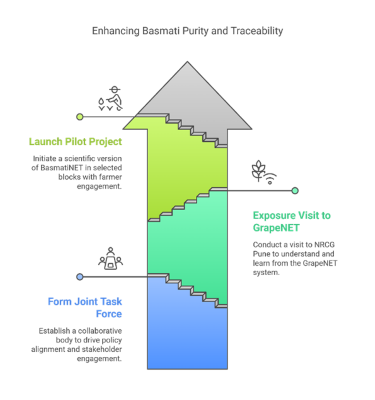The objective of the workshop was to identify the contribution of each stakeholder in the creation and implementation of BasmatiNet in Punjab

The Department of Agriculture & Farmers Welfare, Government of Punjab recently conducted a Workshop on “From Field to Fork: Ensuring Basmati Purity through Comprehensive Traceability in Punjab” at Punjab Kheti Bhawan.
The Theme was “BasmatiNet: Supporting Robust Basmati Exports – Concept to Execution” and the objective of the workshop was to identify the contribution of each stakeholder in the creation and implementation of BasmatiNet in Punjab.
CropLife India has been advocating for the establishment of a Basmati Research Centre in Punjab since 2020—adopting best practices from GrapeNET. This centre aims to offer a collaborative platform for farmers, scientists, policymakers, industry, and exporters—ensuring Punjab remains a trusted and leading source of authentic Basmati rice.
The panellists for the workshop included: Dr Satbir Singh Gosal, Vice Chancellor, Punjab Agricultural University; Jaswant Singh, Director, Department of Agriculture; Dr. Kaushik Banerjee, Director, ICAR-National Research Centre for Grapes, Pune; Harpreet Singh, State In-charge, APEDA and Dr. Ajit Dua, CEO, PBTI - Mohali
Dr. Kaushik Banerjee, Director, ICAR-National Research Centre for Grapes, Pune, delivered an insightful address, highlighting the success of GrapeNET—a robust traceability system developed for grapes, a highly perishable commodity. He emphasized that if such a system can be implemented for grapes, it is both feasible and essential to replicate it for Basmati rice.
Jaswant Singh, Director, Department of Agriculture, emphasized the indispensable role of every stakeholder in supporting our farmers through BasmatiNET. Highlighting that the Punjab's Basmati is renowned worldwide, he advocated for reducing residues and increasing exports to enhance the quality and global reputation of this prized crop. By working together through this initiative, stakeholders can significantly contribute to strengthening the agricultural community and ensuring sustainable growth and prosperity for Punjab’s farmers.
Dr. Satbir Singh Gosal, Vice Chancellor, Punjab Agricultural University, highlighted the power of collaboration between academia, industry, and Government in driving the BasmatiNet initiative forward. He emphasized that Punjab is intrinsically linked to Basmati, owing to its favourable climate, temperature, and soil quality, which provides the ideal conditions for cultivating premium Basmati rice. Concluding on a positive note, Dr. Gosal reaffirmed the University’s dedication to enhancing the quality and strengthening the global export potential of Punjab’s iconic Basmati rice in the near future.
Harpreet Singh, State In-charge of APEDA highlighted export promotion and industry collaboration, emphasizing export requirements and quality standards for radio technology. Mr. Singh emphasized the ongoing collaborations between Food Commissions in Punjab agriculture and horticulture departments and the upcoming international buyer meets; which would yield better stakeholder's coordination.
Dr. (Mrs.) Ajit Dua, CEO, PBTI - Mohali, underscored the critical importance of collaborative efforts among all stakeholders for the success of BasmatiNET. Emphasizing the need to produce residue-free Basmati rice, she highlighted that Government initiatives are aimed at making Punjab residue-free and will play a pivotal role in enhancing the global reputation of both Punjab and India in the near future.
Multiple departments from Punjab Agriculture University were present along with representatives from the Basmati Exporters like LT Foods and Ebro India.
The crop protection industry was present in full fervour with representatives from Bayer, BASF, Corteva, Crystal, Dhanuka, PI Industries, Rallis, SWAL, UPL, Syngenta, T-Stanes, to name a few.
Nirmala Pathrawal from Crop Care Federation of India (CCFI) and Kalyan Goswami from Agro Chem Federation of India (ACFI) were present during the workshop and Pesticides Manufacturers & Formulators Association of India (PMFAI) have agreed to collaborate in this initiative.
Subscribe to our newsletter & stay updated.